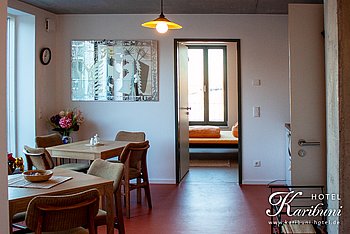Showing others some of the hospitality we experienced in development service
"Karibuni" means "welcome"

Gabriele Schmitz
In 1984, my husband Gernd and I travelled to Tanzania for the first time with our daughter as part of a self-funded voluntary placement. I have a degree in education and Gerd is an industrial engineer with an additional carpentry qualification. We set up a carpentry workshop in a former missionary station in the Usambara Mountains, where Gerd trained local apprentices. Another important aspect of our placement was supporting the work being carried out in the region to educate women and girls. We stayed there for almost seven years, with our work supported by the United Evangelical Mission towards the end of our stay. We were well integrated into village life; our daughter attended the local school and grew up speaking Swahili as a second language. Following a short interlude in Berlin, we returned to Africa in 1991 – this time as development workers with the financial support of the Deutscher Entwicklungsdienst (DED, German Development Service). We were initially based in Bamenda in northwestern Cameroon, where Gerd was responsible for training carpenters and I taught German at a secondary school. We later moved to Douala, where I developed a credit programme for women together with a Cameroonian colleague and Gerd advised carpentry workshops in the poorer neighbourhoods of the city. 1997 saw us back in Berlin, where our daughter completed her school leaving qualifications two years later. But it wasn't long before we returne to Africa again – this time on a placement to Mozambique. Gerd worked for the Weltfriedensdienst e.V: (WFD, World Peace Service) and I worked for AGEH, now AGIAMONDO.
Back in Berlin
In the summer of 2005, we finally moved back to Berlin for good, where we began our foray into self-employment. We bought the Thüringer Hof, a run-down old guest house with twelve rooms, in the district of Neukölln. Now it was time to put into practice all the lessons that we had tried to convey to others during our time in development service: to stand on our own two feet and to remain true to our vision even when the obstacles seem insurmountable. We had been thinking of running a hotel for years. After having experienced such generous hospitality during our time as development service workers, we wanted to give some of this feeling back to others. Tanzania made a particularly strong impression on us in this regard. The name of our hotel, “Karibuni”, is the Swahili word for “welcome” – we heard it constantly during our time there. Our goal was to run a hotel where our guests always feel welcome and well cared for, where there is always time and space for a heartfelt conversation.
The first few years of running the hotel were difficult; we were unsure whether we would be able to make a living. However, thanks to the tireless work of the whole family and word of mouth recommendations from a broad network of friends and contacts around the world, we have been able to establish a solid base of customers. Our customers include relatives of our neighbours, as well as guests from across Germany and from the countries where we have lived and worked over the years.
Never a dull moment
We have been running our little guest house for 19 years now, albeit with fewer rooms and in a new location that is home to a lively cultural scene and many social projects. We are getting to the point where we would like to retire, especially now that our daughter has taken over the reins of the business. However, without the whole family on board, a hotel that focuses on good conversation and treating guests like old friends is simply not economically feasible. What’s more, the interactions we have with our guests are a constant source of pleasant surprises.
For example, when speaking with an elderly couple from Belgium, we discovered that their daughter was working as an interior designer responsible for furnishing tourist lodges in the Kilimanjaro region. One of the local craftsmen she had employed particularly stood out due to the high quality of his work. When she asked him about it, he said that he had learned carpentry 40 years ago from a German carpenter in the Usambara Mountains. It turned out that this man was one of the first students to have graduated from Gerd’s carpentry training workshop all those years ago.
Gabriele und Gerd Schmitz, 1991-1997: Cameroun, DED (now: GIZ), 1999-2005: Mozambique, WFD and AGEH (now: AGIAMONDO)
(Article published in transfer volume 02/2024)
